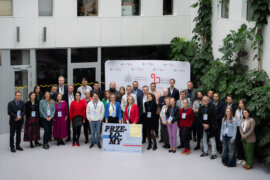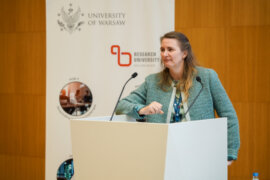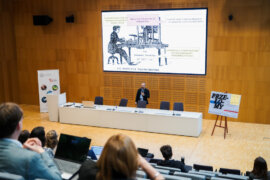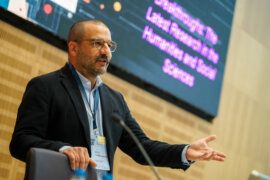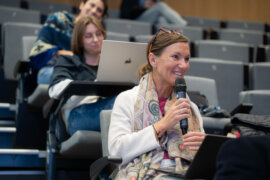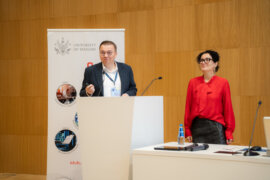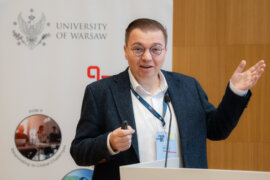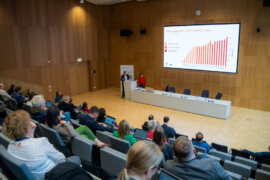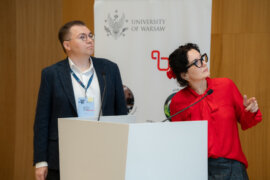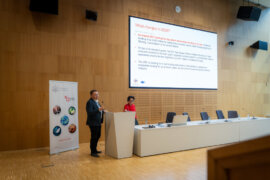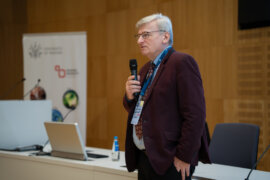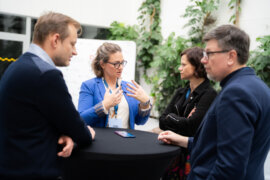Breakthroughs. The latest research in the humanities and social sciences (ed. 2025)
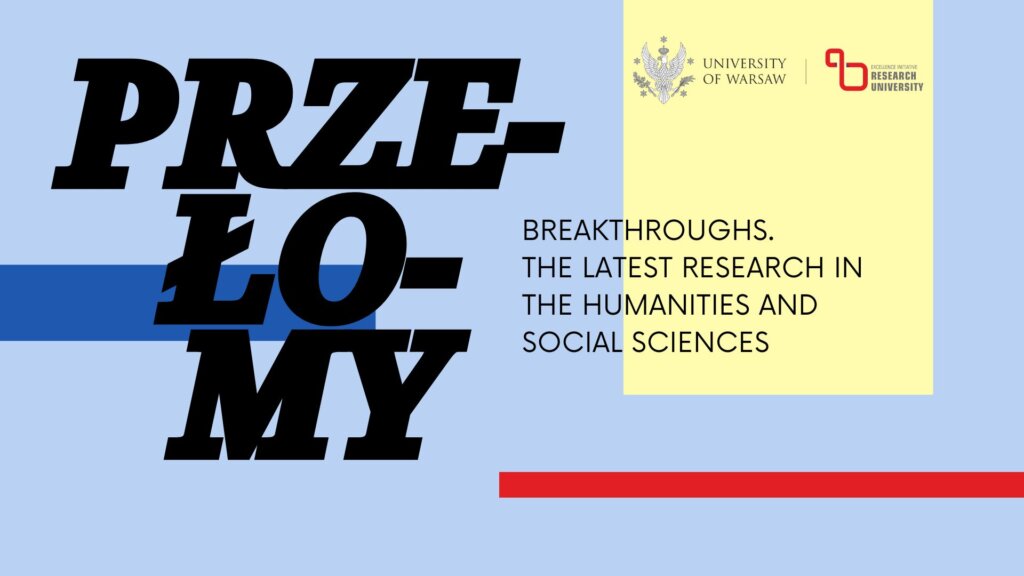
You are kindly invited to participate in the conference “Breakthroughs. Cutting-edge research in the humanities and social sciences”, which will be held on October 16-17, 2025 at the University of Warsaw.
The event is aimed at those conducting projects under POB IV and POB V in the “Excellence Initiative – Research University” Program, including the winners of the “New Ideas” competition. This is a unique opportunity to present the results of your research, network with other researchers and researchers and exchange experiences.
We also invite representatives of the humanities and social sciences, as well as all those interested, to learn about the groundbreaking research conducted under the IDUB Program.
The conference will be an excellent platform for discussion, inspiration, and joint exploration of new areas of research and innovative research methods.
The first day of the conference will open with a lecture by Esther de Smet from Ghent University entitled “Co-creating a healthy impact culture” and a meeting with ERC Ambassadors. The second day of the conference will begin with a guest lecture by Prof. Matt Coler from the University of Groningen entitled “Speaking Machines and Living Languages.”
All those wishing to participate in the event are requested to register by October 10th.
Questions about the conference should be directed to research.managers@uw.edu.pl.
Organisational Committee
- dr hab. Michał Bilewicz
- dr hab. Michał Brzeziński
- dr hab. Tomasz Gackowski, prof. ucz.
- dr hab. Konrad Jankowski, prof. ucz.
- prof. dr hab. Paweł Kaczmarczyk
- Dorota Kazimierczak
- dr Magdalena Kozłowska
- dr hab. Kamil Kuraszkiewicz, prof. ucz.
- dr hab. Agnieszka Otwinowska-Kasztelanic, prof. ucz.
- prof. dr hab. Justyna Olko
- dr hab. Marek Pawełczak, prof. ucz.
- dr hab. Paweł Piszczatowski, prof. ucz.
- dr Adam Płoszaj
- dr Dominik Wasilewski
- Dominik Purchała
- Adam Suwiński
- Michał Szostek
- dr Sebastian Szymański
- dr hab. Katarzyna Śledziewska, prof. ucz.
- prof. dr hab. Robert Wiśniewski
- dr hab. Renata Włoch, prof. ucz.
- dr Julia Wrede
As part of this year’s edition of the conference “BREAKTHROUGHS. The latest research in the humanities and social sciences” we will hear from two exceptional guests.
The first day of the conference, October 16, will open with a lecture by Esther de Smet, research manager and specialist in impact in the social sciences and humanities from the University of Ghent entitled: “Co-creating a healthy impact culture”.
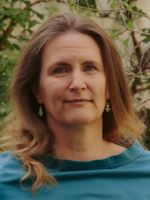 There is no ‘one size fits all’ way to do impact, nor is there a single best institutional structure to deliver it. Impact operates at all levels of an organisation and across multiple job roles. However, irrespective of type, size or funding, impact requires institutions to identify meaningful ways to connect research to the real world, and support the knowledge, skills, resources, and structures needed to deliver it. Impact expertise is vital, but impact cannot be the responsibility of one person; it’s only achievable through teamwork, partnerships and connected actions. Fundamental to this are the development of impact literacy and a commitment to responsible research assessment.
There is no ‘one size fits all’ way to do impact, nor is there a single best institutional structure to deliver it. Impact operates at all levels of an organisation and across multiple job roles. However, irrespective of type, size or funding, impact requires institutions to identify meaningful ways to connect research to the real world, and support the knowledge, skills, resources, and structures needed to deliver it. Impact expertise is vital, but impact cannot be the responsibility of one person; it’s only achievable through teamwork, partnerships and connected actions. Fundamental to this are the development of impact literacy and a commitment to responsible research assessment.Esther de Smet’s lecture will take place on Thursday, October 16, 2025, at 9:30 a.m. in ROOM (AULA) 0.410 (ground floor) in the Modern Languages building (ul. Dobra 55) at the University of Warsaw.
The second day of the conference, October 17, will open with a lecture entitled “Speaking Machines and Living Languages” by Prof. Matt Coler, an expert in voice technology and linguistics, and director of the MSc Speech Technology program from the University of Groningen.
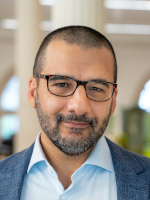 Artificial intelligence has revolutionized speech synthesis, yet this breakthrough excludes all but a handful of major languages. Through an interactive audio history spanning from Von Kempelen’s 1791 mechanical apparatus to today’s neural architectures, this talk traces how each era reimagined what speech fundamentally is: from physical resonance to encodable information to learnable patterns. Live demonstrations show how small regional languages can achieve natural synthesis, challenging assumptions about data requirements. But technical solutions raise more in-depth questions: What transforms when voice moves from embodied cultural practice to decontextualized acoustic reproduction? When lived stimulation becomes technological stimulus? These questions reveal why speech technology increasingly requires methodological contributions from social sciences and humanities: not as auxiliary concerns, but as perspectives on what breakthrough actually means in a field dominated by engineering.
Artificial intelligence has revolutionized speech synthesis, yet this breakthrough excludes all but a handful of major languages. Through an interactive audio history spanning from Von Kempelen’s 1791 mechanical apparatus to today’s neural architectures, this talk traces how each era reimagined what speech fundamentally is: from physical resonance to encodable information to learnable patterns. Live demonstrations show how small regional languages can achieve natural synthesis, challenging assumptions about data requirements. But technical solutions raise more in-depth questions: What transforms when voice moves from embodied cultural practice to decontextualized acoustic reproduction? When lived stimulation becomes technological stimulus? These questions reveal why speech technology increasingly requires methodological contributions from social sciences and humanities: not as auxiliary concerns, but as perspectives on what breakthrough actually means in a field dominated by engineering.Prof. Matt Coler’s lecture will take place on Friday, October 17, 2025, at 9:00 a.m. in ROOM (AULA) 0.410 (ground floor) in the Modern Languages building (ul. Dobra 55) at the University of Warsaw.
DAY ONE | 16.10.2025
| Aula 0.410 | ||
| 09:00 | Welcome, Julia Wrede, Adam Suwiński
Grand Opening, Vice-Rector prof. Zygmunt Lalak, IDUB Programme Manager |
|
| 09:30 | Keynote speaker: Esther de Smet (Ghent University) „Co-creating a healthy impact culture” | |
| 10:30 | prof. dr hab. Justyna Olko, prof. dr hab. Michał Tomza – ERC Ambassadors | |
| 11:00 | Coffee break | |
| 11:20 | Session 1 | Room 1.128 | Session 2 | Room 1.110 |
| K. Czopek: Not all connections are equal: How social networks develop and shape language learning abroad
U. Wicenciak-Núñez: Od perfum do wielofunkcyjności: przełomy w badaniach naczyń ceramicznych z Fenicji z okresu hellenistycznego i rzymskiego M. Trzeciak-Cygan: Sekretarze dyplomatyczni jako podróżopisarze: Włosi w Rzeczypospolitej Jana III Sobieskiego J. Włodarczyk: Psy, ludzie, lasy i grzyby. Etnografia wielogatunkowa renesansu truflowego |
K. Jankowski: Prezentacja Wewnętrznego Panelu Badawczego
K. Fronczyk: Interakcyjny kwestionariusz przywiązania: kontekstowa perspektywa w badaniu relacji N. Letki: Faworyzowanie grupy własnej czy uprzedzenia wobec grupy obcej? Eksperymentalne dane na temat mechanizmów wyjaśniających zjawisko dyskryminacji W. Kloc-Nowak / J. Caldeira: Fertility intentions of Ukrainian women and men in Poland – to what extend do they depend on their perception of global threats? |
|
| 12:40 | Lunch | |
| 13:50 | Session 3 | Room 1.128 | Session 4 | Room 1.110 |
| J. Dolińska: Why is Thailand so multilingual and biodiverse at the same time?
H. Paulouskaya: Jak koniec stał się początkiem: narodziny radzieckiej animacji o mitach greckich C. Heliasz-Nowosielska: Piękno komunikacji. Wartościowanie w relacjach z działań komunikacyjnych w języku polskim W. Skorupska: To jest eksperymentowanie, to jest doświadczenie. Dyskurs jako siła sprawcza wspólnot kooperatywnych |
S. Talaga: Negative news posts are less prevalent and generate lower
E. Wertz: Correlates of and Counterstrategies to News Non-Use: Systematic Review and Prescriptive Framework A. Weidenfeld / S. Gańko: Do we function as networks or systems? M. Łączyński: Zagadki multimodalne jako potencjalne narzędzie do tworzenia benchmarków rozumowania AI – studium przypadku |
|
| 15:10 | Coffee break | |
| 15:30 | Session 5 | Room 1.128 | Session 6 | Room 1.110 |
| A. Grabski: Konwersje na judaizm w Polsce na pocz. XXI wieku
U. Ługowska: Polska w kronikach Martina Caparrosa L. Tuwalska-Napiórkowska: Dokumentacja nowoaramejskiego dialektu z Hawdiyan A. Wysztygiel: Jak profesjonalnie udostępniać teksty źródłowe w internecie? O Pracowni Edycji Cyfrowych na UW |
D. Batorski / M. Wojcieszak: Changes to the Facebook Algorithm Drastically Decreased News Visibility Between 2021-2024
P. Matuszewski: Partisan Media Dynamics: Comparative Analysis of Publication Spikes Across Major Events in the US and Europe R. Więckiewicz / K. Brylska: Prawda algorytmu, prawda kandydata. Percepcja autentycznych i generowanych przez AI komunikatów politycznych H. Calleros / S. Nowakowski: Deciphering Imperial Subjugation: Neural Network Analysis of Spain’s Archival Sources |
|
| 16:50 | End of the first day of the conference | |
DAY TWO | 17.10.2025
| Aula 0.410 | ||
| 09:00 | Keynote speaker: Matt Coler (University of Groningen) „Speaking Machines and Living Languages” | |
| 10:30 | Coffee break | |
| 10:50 | Session 7 | Room 1.132 | Session 8 | Room 1.110 |
| M. Paradowski: Forced immersion, unequal outcomes: Network analysis of Ukrainian refugees’ acquisition of the Polish language
K. Timmer / K. Broś / A. Otwinowska: Timing Language. What EEG Reveals About Successful Communication U. Pawelec / A. Borzym / A. Otwinowska: How are different words processed when reading longer texts in English? An eye-tracking study K. Ogrodniczek / K. Czopek / A. Kałdonek: Perceptions of bilingualism and multilingualism among medical and speech professionals working with children with neurodevelopmental conditions |
M. Wilkowski: Czy można archiwizować internet i dlaczego w ogóle warto to robić?
M. Sztyber-Popko: Między deklaracją a reakcją: jak sztuczna inteligencja zmienia pracę dziennikarzy – eksperyment biometryczny A. Balcerzak: Treści tworzone przez użytkowników a treści generowane przez sztuczną inteligencję – eksperyment behawioralny A. Pazio / M. Sobiech-Buzała: Jak zmienia się duchowość online? Streaki modlitewne, wellness i tradycja w uniwersum komunikacyjnym aplikacji Hallow |
|
| 12:10 | Lunch | |
| 13:10 | Session 9 | Room 1.132 | Session 10 | Room 1.110 |
| D. Dzierzbicka / D. Elagina: Tracing patterns of knowledge transmission in a 16th-century Ethiopian diaspora through watermarks on paper manuscripts
M. Jakubowska: Komunikacja na osmańskim pograniczu. Czego możemy dowiedzieć się z korespondencji mołdawskich książąt z Rzecząpospolitą w końcu XVI wieku? M. Tarkowski: Pracownia Wizualizacji CKC UW |
T. Gackowski / N. Strąk: Od ChatGPT do DeepSeek: Imaginarium sztucznej inteligencji na okładkach magazynów polskich i niemieckich
J. Wasilewski / K. Brylska: Sztuczne komplementy, prawdziwe emocje. Czy pochwały napisane przez boty mogą poprawiać nam nastrój? P. Szymanek: Rola dobrowolnego przyjęcia MSSF jako odpowiedź na nierówności dochodowe w Polsce M. Grabowska / A. Górny: Jak dochody innych kształtują nasz dobrostan w czasach niepewności: analiza porównawcza Polaków i Ukraińców w Polsce |
|
| 14:30 | Coffee break | |
| 15:00 | Session 11 | Room 1.132 | Session 12 | Room 1.110 |
| J. Orchowska: Mieszkania poza zasięgiem? Doświadczenia mieszkaniowe klasy średniej w Warszawie i Gdańsku
D. Kudła: Odbiór generatywnej sztucznej inteligencji w lokalizacji gier wideo przez użytkowników B. Czaplicki: Lexical conservatism provides evidence for whole-word storage |
E. Zakrzewska: Zmiana władzy w Polsce po wyborach parlamentarnych w październiku 2023, a jej wpływ na depolaryzację mediów. Studium przypadku TVP 1
G. Kowalczyk: Fact-checking czy agitacja? Narracje polityków w czasie pandemii COVID-19, kampanii prezydenckiej 2020 i kryzysu klimatycznego A. Mierzecka / N. Strąk: Narzędzia sztucznej inteligencji w kontekście wyszukiwania informacji: badanie biometryczne A. Piątek: Szwedzkojęzyczna mniejszość Finlandii na przykładzie mieszkańców KAJ-land. Tożsamość językowo-kulturowa lokalnej społeczności, status dialektu i zachodzące w nim zmiany pokoleniowe |
|
| 16:20 | Summary, thanks, and farewell | |
